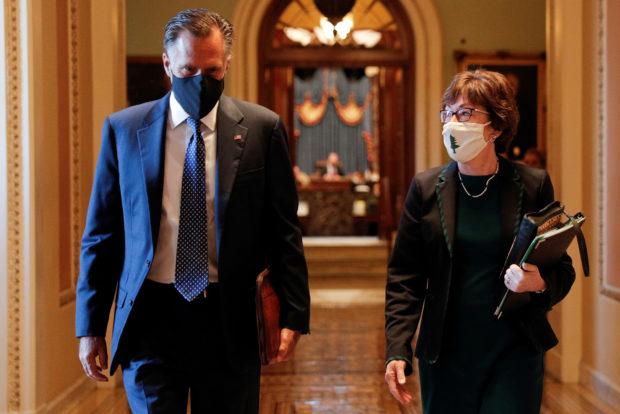
Senators Mitt Romney (R-UT) and Susan Collins (R-ME) walk to the office of the Majority Leader from the Senate Chamber ahead of a meeting with Senate Majority Leader Mitch McConnell (R-KY) on Capitol Hill in Washington, U.S., December 3, 2020. REUTERS/Tom Brenner/File Photo
WASHINGTON – Ten moderate Republican U.S. senators urged Democratic President Joe Biden on Sunday to significantly downsize his $1.9 trillion COVID-19 relief package to win bipartisan support as Democrats in Congress prepared to push ahead with his plan this week.
A top White House economic adviser signaled willingness to discuss the ideas raised by Republican senators who floated a $600 billion alternative, but said the president was not willing to compromise on the need for a comprehensive bill to address the public health crisis and economic fallout.
“He is open to ideas, wherever they may come. … What he’s uncompromising about is the need to move with speed on a comprehensive approach here,” Brian Deese, director of the National Economic Council, told NBC’s “Meet the Press” program. “A piecemeal approach … is not a recipe for success.”
It was unclear whether the outreach by 10 of the 50 Republicans in the 100-seat chamber would shift plans by congressional Democrats to take up legislation in the coming days. Biden and fellow Democrats are seeking to make use of their control of the House of Representatives and Senate to move quickly on the president’s top goal of addressing the pandemic.
Senate Majority Leader Chuck Schumer has said his chamber would begin work on it as early as this week. House Speaker Nancy Pelosi said Congress would complete a preliminary step before the end of the week.
Congress enacted $4 trillion in COVID-19 relief last year.
Passage of the new relief legislation not only would impact Americans and businesses reeling during a pandemic that has killed about 440,000 people in the United States but also offers an early test of Biden’s promise to work to bridge the partisan divide in Washington. Biden took office on Jan. 20.
Biden’s proposal includes $160 billion for vaccines and testing, $170 billion for schools and universities, and funds to give certain Americans a $1,400 per-person stimulus check, among other provisions.
Some Republicans have questioned the overall price tag, while others urged more targeted measures, particularly over the direct payments to individuals.
In their letter to Biden, Susan Collins, Lisa Murkowski, Mitt Romney and seven other senators asked Biden for a meeting and said their compromise proposal could be quickly passed with bipartisan support, promising more details on Monday.
They said their proposal included more targeted assistance for families in need and additional funds for small businesses, while echoing Biden’s $160 billion for more funding to boost vaccines and testing. They also pointed to unspent money from previous COVID-19 relief bills.
“Ours is about $600 billion. … We’re targeted to the needs of the American people,” Senator Bill Cassidy, one of the 10 senators, told “Fox News Sunday.”
Cassidy added that their plan included less school funding, saying many private schools had already reopened and that the “the real problem is public schools” and “teachers’ unions telling their teachers not to go to work.”
Fellow Republican Rob Portman, who also signed the letter, told CNN’s “State of the Union” program that direct checks should be limited to individuals making $50,000 and less and families making $100,000 or less.
Deese said the White House was reviewing the letter but did not say whether Biden would meet with the group, which also included Republicans Shelley Moore Capito, Todd Young, Jerry Moran and Michael Rounds.
The United States leads the world in COVID-19 cases and deaths by a large margin. Biden’s administration is seeking to scale up lagging vaccination efforts as new problematic variants of the novel coronavirus emerge.
Some moderate Democrats also urged changes to Biden’s package while more liberal Democrats have pushed for more spending and other provisions such as a federal minimum wage hike to $15-an-hour — more than double the current $7.25-and-hour.
Senator Jon Tester, a Democrat from Montana, told CNN’s “State of the Union” program that the Republicans’ letter was “a positive sign that folks want to work together.”
With the Senate split 50-50 and Vice President Kamala Harris wielding the tie-breaking vote, Democrats are considering using a parliamentary tool called “reconciliation” that would allow the chamber to approve the bill with a simple majority. Under Senate rules, legislation usually requires 60 votes for passage.